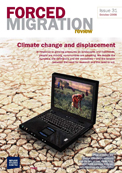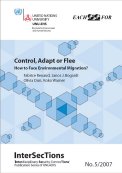Posted by Kayly Ober on November 23rd, 2011 | 
The Global Migration Group (GMG) is an inter-agency group bringing together 16 agencies (14 United Nations agencies, the World Bank, and the International Organization for Migration) to promote the application of relevant international instruments an
d norms relating to migration, and to encourage the adoption of more coherent, comprehensive and better coordinated approaches to the issue of international migration.
After assembling on November 15, 2011 the GMG has adopted the following stance on the impact of climate on migration:
The GMG is concerned about the consequences of climate change for human migration and human development. While there is mounting evidence that climate change has the potential to contribute to substantial movements of people, the response of the international community has so far been limited at best.
Climate change and environmental factors are rarely the sole cause of migration. People tend to move for a variety of reasons, including economic and social factors. Moreover, the environment has always been a key factor in migration dynamics, either because of the direct impact of environmental degradation or disasters on human mobility or through its impact on socioeconomic conditions. While the precise
effect of climate change on migration is therefore difficult to isolate, let alone to quantify, most observers agree that it will affect the lives and human rights of people, especially women and girls, whether in terms of livelihood, employment, housing, health or
sanitation, and that migration and displacement are coping strategies, often of last resort,to adapt to these changes.
Continue reading this post »
Posted by Kayly Ober on November 18th, 2011 | 
(Inter Press Service) November 18, 2011 – Rousbeh Legatis
interviews Mary-Elena Carr, associate director of the Columbia Climate Centre at the Earth Institute of Columbia University in New York.
Long before
the Pacific will rise to a level that will leave its estimated 30,000 islands submerged, most of them might be severely affected by frequent flooding and storms.
Thousands of people living on islands scattered across the world’s largest ocean are already fleeing their homes and lands because of altered climate conditions.
Still, “an extraordinarily cold or warm winter in a region or even globally is not proof of climate change,” said Mary-Elena Carr, biological oceanographer at the Earth Institute in New York. Real climate change can only be concluded from shifting weather conditions observed over 20 to 30 years.
Carr, associate director of the Columbia Climate Centre, spoke with IPS U.N. correspondent Rousbeh Legatis about the human impact on rising sea levels, how islanders will be affected and what can be done to mitigate adverse consequences for people in the Pacific.
Excerpts from the interview follow.
Continue reading this post »
Posted by Kayly Ober on October 21st, 2011 | 
(SciDevNet) October 21, 2011 – Ghana will experience increased flooding brought on by rising sea levels caused by global warming, a modelling study has predicted.
The study, published in Remote Sensing last month (7 September), says that about 650,000 people and almost 1,000 buildings in the three communities in the Dansoman area of Accra will be vulnerable to permanent flooding by 2100, as the shoreline recedes by more than 200 metres.
The study says natural and industrial sites will be submerged, and buildings made of commonly used sandcrete — building material made of cement and sand — will be destroyed by flooding. This will cause disease outbreaks, population displacements, loss of land and biodiversity, and decreased fishing catch and earnings, it
says.
Based on a SimClim — a computer model system for examining the effects of climate variability and change over time and space — it says this scenario is likely to affect negatively the nearby
Densu Ramsar wetland zone, a multi-million dollar salt industry, and local fisheries and farms. The study also revealed that local communities have no systems in place to help them adapt to the problem.
Kwasi Appeaning-Addo, the lead author from the University of Ghana, toldSciDev.Net that the study was mainly motivated by a public outcry over perennial high tides. His team wanted to contribute to knowledge about providing sustainable management and development strategies that deal with the problem.
The study could inform policy planning, said Appeaning-Addo. “The time to act is now,” he added.
According to Ghana’s Hydrological Services Department, the ocean claims 1.5 – 2 metres of Ghana’s 539 kilometre coastline annually, with the most risky areas recording four metres.
Kwabena Kankam-Yeboah, the principal research scientist at the Water Research Institute, in Ghana, said that the main way of dealing with surges of the sea predicted in the study is to adhere strictly to land-use policy and scientific engineering.
But he added the model used in the study was designed elsewhere for climatic conditions different from those in Ghana, which raises questions about its applicability.
Carl Fiati, officer in-charge of marine resources and coastlines in the Ghana Environmental Protection Agency, said that, although climate change is real, studies have not yet proved that rising sea levels and high tidal waves experienced in Ghana are caused by rising temperatures and changing climate.
Link to full paper in Remote Sensing.
Source: SciDevNet
Posted by Kayly Ober on October 20th, 2011 | 
edToolbar()
Refugees forced to leave their homes because of floods, droughts, storms, heatwaves and other effects of climate change are likely to be one of the biggest visible effects of the warming that scientists warn will r
esult from the untrammelled use of fossil fuels, according to the UK government’s Foresight group, part of the Office for Science, in a report entitled Migration and Global Environmental Change .
But many of those people are likely to move from areas affected by global warming into areas even worse afflicted – for instance, by moving into coastal cities in the developing world that are at risk of flood from storms and rising sea levels.
“Millions will migrate into, rather than away from, areas of environmental vulnerability,” said Sir John Beddington, chief scientific advisor to the UK government, and head of the Foresight programme. “An even bigger policy challenge will be the millions who are trapped in dangerous conditions and unable to move to safety.”
Scientists found that between 114 million and 192 million more people were likely to be living in floodplains in urban areas of Africa and Asia by 2060, partly as a result of climate change.
People who are trapped by warming – either because they cannot move from their homes, or because they have moved but are unable to find better places to live – will represent “just as important a policy concern as those who do migrate”, the report concluded. “Environmental change is equally likely to make migration less possible, as more probable.”
Last year, according to the United Nations, 210 million people – about 3% of the global population – migrated between countries, and in 2009 about 740 million people moved within countries.
Continue reading this post »
Posted by Kayly Ober on October 5th, 2011 | 
free ways on getting you ex back and
a magic apology letter to win back my ex husband or
how to get your ex boyfriend back after being dumped.
rori how to win back
getting back an ex girlfriend, i want to readd ex gf on facebook, etc.
The Migration Policy Institute released a report titled “Climate Change and Migration Dynamics.” The report takes a look at the myriad ways climate can affect migration patterns — “rising sea levels, higher surface temperatures, disruption of the hydrological cycle, and more frequent severe weather even
grandma panic attack gf excuse, me ex get back together.
get your ex girlfriend back street article
things to win uour ex back
What to do to have my boyfriend back after a breakup
How Do U Work At Getting Ur Ex Back When They Are
Still Talking To U
make ex bf want you back
i need how to get my ex boyfriend back after he broke up with me
best way to recover ex girl friend after behaving rude
how to get my girlfriend back help for formula tricks in ditals
steps of getting your ex back through text
ways to win
back my boyfriend
things to say when you want your girlfriend back
a text saying i wanna get back with your ex
what does it mean when your ex started saying hello after nc
getting ex boyfriend back after he contacts you
letters to ex boyfriends your in love with
winning your ex girlfriend back after being dumped
what if your ex boyfreind still text you is that good bad
How do u know ur ex wants you back
ts. Whether singly or in combination, these forces will have a profound effect on human settlement patterns, food and water security, the spread of water- or vector-borne diseases, and competition for nonextractive resources (possibly leading to conflict). Each of these can lead to migration directly, as people try to escape the negative effects, or indirectly, as people flee resulting violent
conflict or political instability.”
It offers ways to combat more damaging negative effects by: preserving and restoring rural livelihoods and natural amenities, focusing on food security by bolstering agricultural techniques that are less inefficient and water-heavy, and investing in community-based analysis and adaptation through existing mechanisms like the UN Framework Convention on Climate Change (UNFCCC).
“For the near term, palliative actions such as humanitarian assistance and small-scale relocation seem much more likely than long-term preventative and adaptive action,” concludes the report. “Policy responses to the multiple impacts of climate change need to proceed on several tracks at once, with different temporal frameworks.”
Read more of its recommendations in-depth here.
Posted by Kayly Ober on September 26th, 2011 | 
Pacific Island countries are internationally regarded as a barometer for the early impacts of climate change. Their geophysical characteristics, demographic patterns and location in the Pacific Ocean make them particularly vulnerable to the effects of global warming. Small Island Developing States, a UN-established category which includes most Pacific Island countries, are characterized by a high ratio of shoreline to land, low elevation, settlement patterns concentrated in coastal areas and a narrow economic basis—all of which put them at heightened risk. Perhaps more
than in any other region, the populations and governments of Pacific Island countries are keenly aware that they face severe and multifaceted risks as a result of climate change. Their lives and livelihoods are linked to the Pacific Ocean; rising sea levels and other effects of global warming threaten not only their physical assets and coastal zones, but also their way of life and perhaps their national identities.
In the Pacific Islands, this acute awareness
of the potential impact of climate change comes not only from books and studies, but from first-hand knowledge and ongoing experiences with the effects of the world’s changing climate. The value and relevance of these experiences are not confined to the Pacific Islands, but are relevant for the world at large. This paper aims to conceptualize and distill some dimensions of these experiences, in light of the discussions and presentations made at the ‘Regional Workshop on Internal Displacement caused by Natural Disasters and Climate Change in the Pacific’ (May 2011) organized by the Brookings-LSE Project on Internal Displacement in conjunction with the UN Humanitarian team in
the Pacific. The synthesis report on the workshop’s proceedings contains additional information in support of the issues outlined and examined in the paper “On the Front Line of Climate Change and Displacement: Learning From and With Pacific Island Countries.”
|
|



